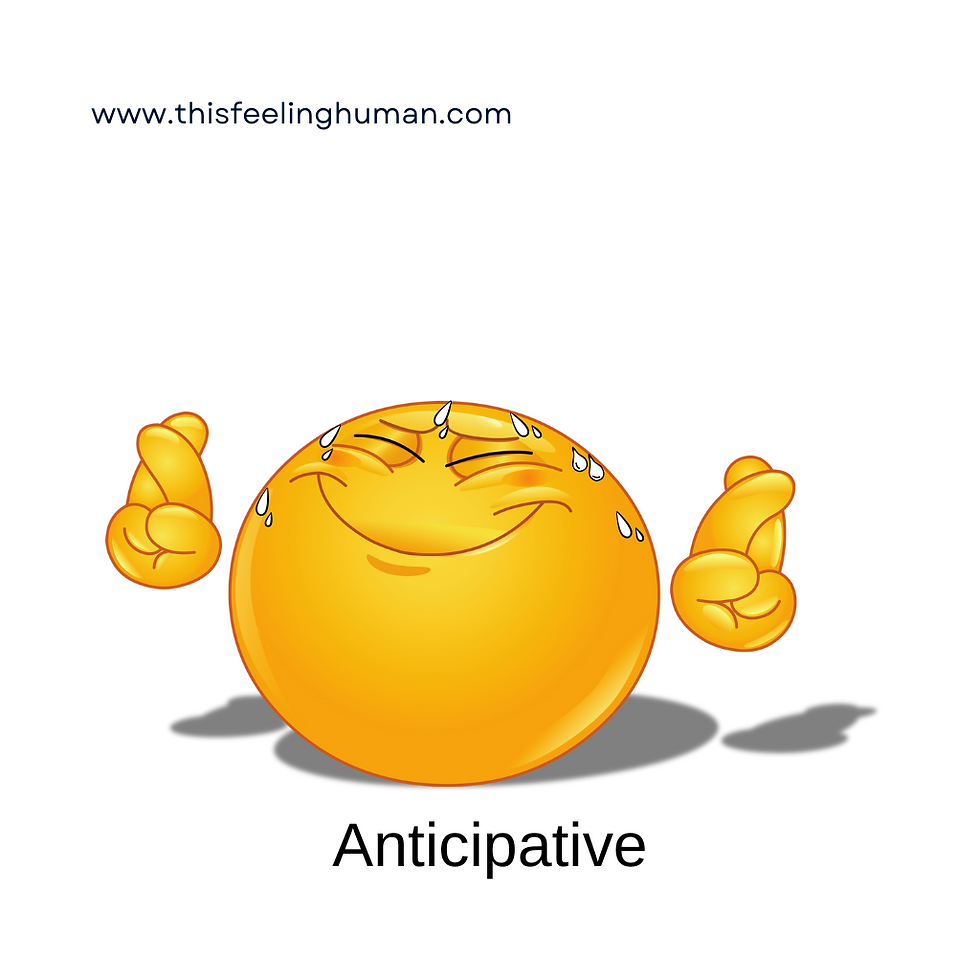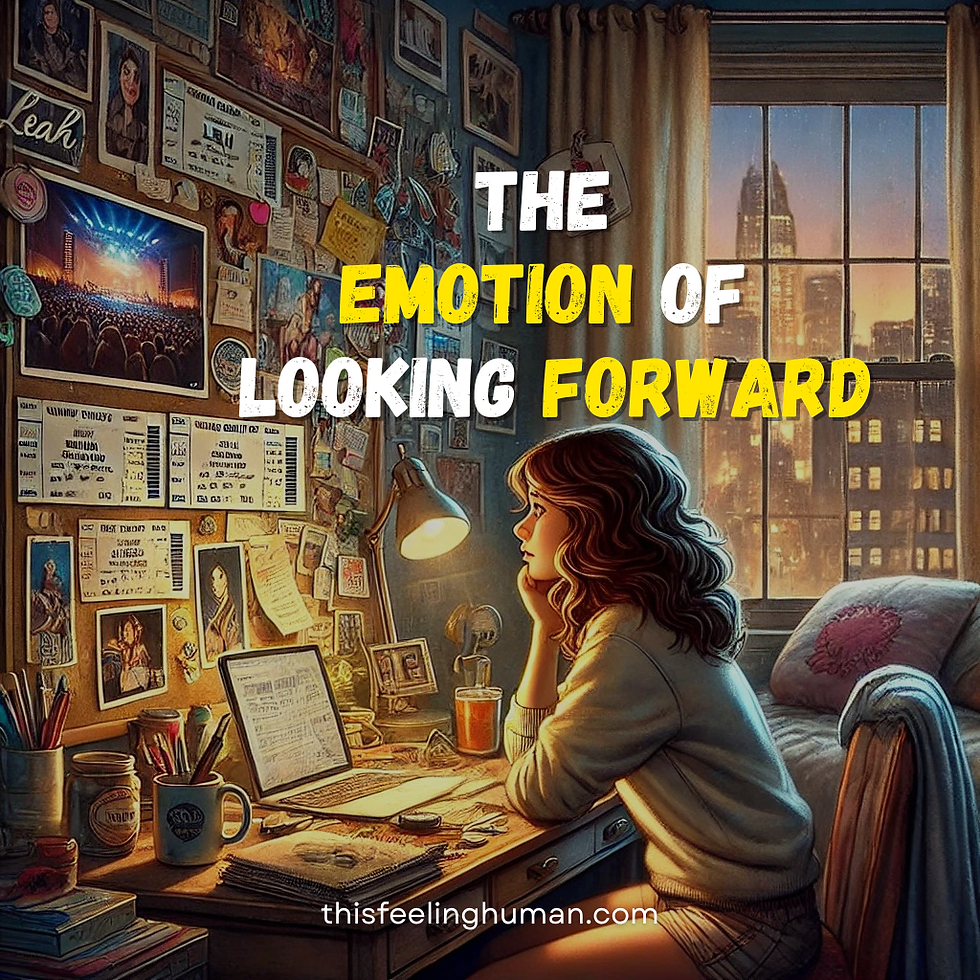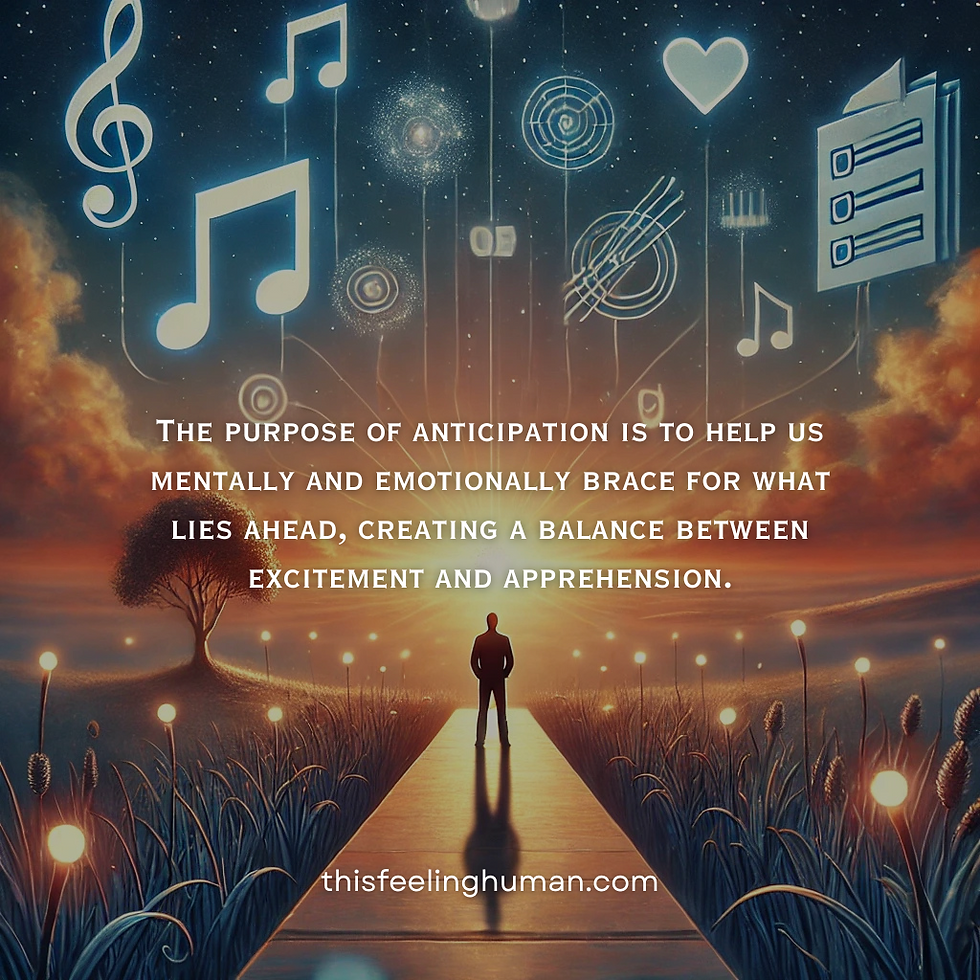The Story of Anticipation: A Bridge Between the Present and the Future
- TFH
- Nov 20, 2024
- 6 min read
Updated: Nov 21, 2024
The Emotions Library project is a collection of stories about the emotion(s) we experience. Stories bring meaning and clarity, helping us understand our emotions better. We do this so everyone can access knowledge, gain emotional literacy, and develop self-awareness. Today, we’re talking about a feeling we all know well: anticipation.

The feeling of anticipation informs us that we are mentally and emotionally preparing for something about to happen. It signals a readiness for the future, whether it's a positive event that excites us or a challenging one that causes anxiety. Anticipation helps us focus on what lies ahead, encouraging us to plan, take action, and reflect on our emotions. It also highlights our need for control, reassurance, or emotional balance, and teaches us to manage both the excitement and the uncertainties that come with expecting something in the future.
Story: Looking forward to something in the future with eagerness or anxiety.
Impulse: Plan or prepare.
Etymology: From Latin anticipare, meaning to take care of ahead of time.
Purpose: Anticipation helps the person prepare mentally and emotionally for future events.
Emotional Regulation and Journaling
In collaboration with Calm3D, we invite you to create a safe and supportive space for navigating the emotions of anticipation. Whether you're feeling excited or anxious about what's to come, this is a place where you can find peace, clarity, and emotional balance as you reflect on your expectations and feelings.
Take a step toward self-discovery and emotional insight by visiting www.playcalm3d.com. Let Calm3D’s serene environment guide you as you journal and explore the emotions of anticipation. Peace and understanding await you.
Reflective Questions
1. What are you most excited or anxious about?
2. How can you prepare yourself for both expected and unexpected outcomes?
3. What does it feel like to stay present in this moment of anticipation?
Let’s take a look at Leah’s story to see how she handled the ups and downs of anticipation. She offers some helpful insights on finding clarity when you're feeling both excited and anxious.
Looking Forward to Something in the Future with Eagerness or Anxiety
Leah sat at her desk, her eyes drifting to the concert tickets pinned on her vision board. One week to go, she thought, her heart fluttering with excitement. The band had been the soundtrack to her life, accompanying her through both joys and sorrows. She could almost hear the music, feel the bass thumping, and see the stage lights blazing.
But as anticipation coursed through her veins, anxiety whispered doubts: What if it rains? What if I get stuck in traffic? What if it’s not as good as I imagine? This blend of eagerness and fear felt like a rollercoaster, making the days leading up to the concert both exhilarating and nerve-wracking.

To balance her emotions, Leah leaned into preparation. She chose her outfit, made plans with friends, and listened to the band’s latest playlist on repeat. At the same time, she practiced mindfulness, reminding herself to stay present and savor the buildup.
By the time the big day arrived, Leah had embraced both the excitement and the nerves. As the first song filled the air, she realized that the journey of anticipation had deepened her appreciation for the moment.
Impulse: Plan or Prepare
Anticipation often triggers the impulse to plan or prepare, as it serves as a bridge between the present and the future. This impulse can manifest in different ways depending on the nature of the event we’re anticipating. For Leah, her eagerness to experience the concert led her to take deliberate action—picking the perfect outfit, organizing logistics, and syncing up with friends. These actions weren’t just about managing the day—they were also about channeling the energy of anticipation into something concrete, something that made the waiting period feel productive.
For some, this impulse might lead them to over-prepare, trying to control every possible outcome. For others, it may involve emotional preparation, where we confront our worries, breathe through the anxiety, and develop a sense of readiness, as Leah did by using mindfulness techniques. In all cases, the impulse to prepare is fueled by the desire to ensure that the event, and the emotional journey leading up to it, unfolds in a way that feels both manageable and meaningful.
The Origins of ‘Anticipative’
The word anticipative comes from the Latin verb anticipare, meaning "to take care of ahead of time." The root ante- means "before," and capere means "to take," so anticipare translates to "to take before" or "to take care of ahead of time." This etymology reveals how anticipation is inherently connected to proactive mental and emotional preparation. Rather than waiting passively for an event to unfold, anticipation empowers us to prepare for what lies ahead. This preparation isn't just about organizing logistics or controlling the environment—it's also about mentally and emotionally aligning ourselves with the future.
The Purpose of Anticipation
Anticipation serves a significant purpose in our emotional and mental landscape. It isn’t merely about waiting for an event; it’s about preparing for it in a way that enhances the experience itself. The purpose of anticipation is to help us mentally and emotionally brace for what lies ahead, creating a balance between excitement and apprehension. It helps us to make informed decisions, feel more in control, and increase our overall resilience in the face of the unknown.

For Leah, the purpose of anticipation was both practical and emotional. By preparing for the concert, she wasn’t just organizing her evening; she was mentally preparing to savor the moment. The anticipation gave her a sense of control, allowing her to manage her excitement and anxiety. It also made the event itself feel more significant because the emotional preparation created a deeper connection to the experience when it finally arrived.
This emotional preparation extends to any situation in life. Whether anticipating a big presentation, a new relationship, or a significant life change, the purpose of anticipation is to help us face what’s ahead with confidence and clarity. Emotional literacy plays a key role in this process, as it allows us to name the feelings that arise and understand their underlying purpose. By being emotionally prepared, we are better equipped to handle whatever outcomes may come—whether expected or unexpected—and embrace the journey with openness.
Emotional Literacy: Understanding the Power of Anticipative Emotions
Anticipation is not just about the future; it’s about how we navigate the present moment leading up to it. Leah’s journey highlights how emotional literacy transforms anticipation into a tool for growth. By sharpening our ability to name and explore our emotions, we can:
Channel excitement into constructive action.
Reframe anxiety as a call for preparation.
Find joy in the build-up to meaningful moments.
Reflective Questions to Deepen Awareness
To better understand and manage anticipation, consider these questions:

What are you most excited or anxious about?
Identifying specific aspects of anticipation helps focus your energy.
How can you prepare yourself for both expected and unexpected outcomes?
Emotional readiness complements practical preparation.
What does it feel like to stay present in this moment of anticipation?
Naming your physical and emotional sensations grounds you in the now.
Anticipation, with all its complexity, is a powerful emotion. It bridges the present and future, inviting us to prepare, reflect, and savor life’s unfolding moments.
Final Thoughts
On the night of the concert, as the band played her favorite song, Leah felt a wave of gratitude. She realized that the anticipation—the mix of eagerness and nerves—had made the experience richer. By navigating her emotions with awareness, she had turned what could have been a source of stress into an opportunity for reflection and growth.
Anticipation, as Leah discovered, is a gift. It teaches us to prepare, to feel deeply, and to savor the in-between moments that make life meaningful. Through emotional awareness, she was able to embrace the full experience, making the event even more impactful than she could have imagined. In the end, it was the journey of anticipation that deepened her connection to the moment and herself.
If Leah’s story resonates with you and you’re ready to deepen your emotional literacy, consider exploring Emoli Cards. These thoughtfully designed cards can help you articulate your feelings, navigate the complexities of anticipation, and gain valuable insights into your emotional landscape. They’re an excellent tool for understanding emotions like eagerness and anxiety and can bring clarity to your emotional journey.
For more personalized support, we invite you to book an Emotions-Based Coaching session. Together, we can explore your emotional experiences, uncover your inner strengths, and work toward greater self-awareness and balance. Your journey toward emotional empowerment begins now—let’s take that first step together!
Comments